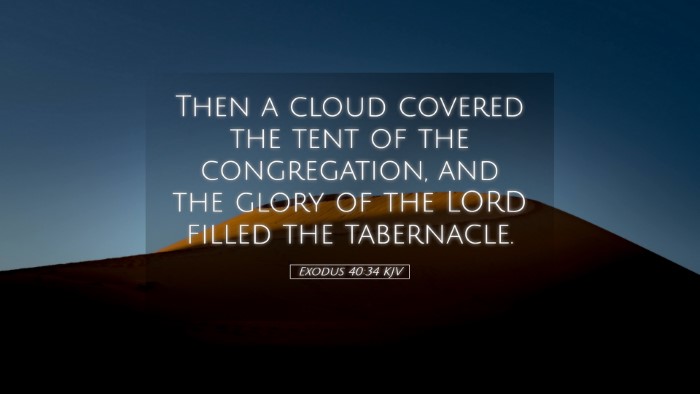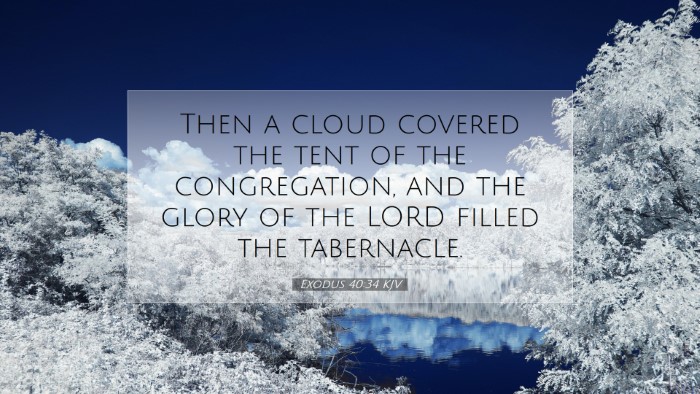Commentary on Exodus 40:34
Exodus 40:34 states: "Then a cloud covered the tent of the congregation, and the glory of the LORD filled the tabernacle." This verse marks a pivotal moment in Israel's history, symbolizing God's presence among His people. In this commentary, we will explore its significance through insights from public domain commentaries by Matthew Henry, Albert Barnes, and Adam Clarke.
1. The Symbol of God's Presence
Matthew Henry profoundly captures the essence of this event, emphasizing that the cloud represented the divine presence of God. He notes that the cloud covering the tent signifies not only protection but also the manifestation of God's glory. For the Israelites, this was reassurance that their God was dwelling among them, guiding and leading them through the wilderness.
Albert Barnes elaborates on the theological implications of the cloud. He posits that this cloud serves as a type of Christ, the fulfillment of God’s promise of presence and salvation. Barnes points out that the tabernacle was a foreshadowing of the New Testament church, where God's glory would dwell among His people in a more profound way through the Holy Spirit.
2. The Glory of the LORD
The phrase "the glory of the LORD filled the tabernacle" is significant as it underscores God's holiness and majesty. Adam Clarke comments on this glory, explaining that it is the manifestation of the divine essence which is so overwhelming that it cannot be fully perceived by mortal eyes. Clarke draws attention to the historical context, reminding us that this was not merely a display of light, but a staggering revelation of God's sovereign presence.
3. The Tabernacle as a Meeting Place
The tabernacle served as the central location for worship and sacrifice, embodying the covenant relationship between God and His people. Matthew Henry highlights that this cloud was not just an indicator of God’s presence but also a warning; the people were to recognize that approaching this holiness necessitated reverence and purity. The tabernacle thus becomes a microcosm of heaven, establishing a space where heaven meets earth.
Albert Barnes also emphasizes the tabernacle's role as a meeting place, likening it to the spiritual communion believers have with God today. He asserts that just as God filled the tabernacle, the believer today is filled with the presence of the Holy Spirit, establishing an intimate and direct communion with the Almighty.
4. Response to God's Glory
Consideration of how the Israelites responded to this divine glory is critical. Adam Clarke draws attention to the reverent fear the people must have felt witnessing such an extraordinary display. The presence of the cloud would be accompanied by an awe-inspiring silence, as the Israelites experienced a profound encounter with their God. This moment, Clarke argues, reinforced their faith and obedience.
Matthew Henry notes that God's glory revealed in the tabernacle demands a response from His people; it calls for worship, admiration, and obedience. This act of God conferred upon the people a clear direction for their lives as they journeyed forth from the wilderness toward the Promised Land.
5. Theological Implications for Today
For pastors and theologians, this text offers rich theological insights. Albert Barnes encourages the reader to see this event as a reminder of God’s continued presence in the life of the Church. He underscores that just as the glory filled the tabernacle, believers today are charged with ensuring that God’s presence is palpable in their worship and communal life.
Matthew Henry emphasizes the importance of creating spaces in our churches and personal lives that invite God's presence. He challenges modern believers to cultivate an attitude of reverence and expectancy, paralleling the Israelites’ experience with our need for encounters with God.
6. Conclusion
Exodus 40:34 is more than a historical event; it serves as a theological cornerstone that reflects the nature of God’s relationship with His people. Together, the insights from Matthew Henry, Albert Barnes, and Adam Clarke reveal that the glory of the LORD filling the tabernacle is a profound call to recognize and respond to God’s continuing presence and holiness in our lives. This passage calls theologians, pastors, and all believers to a deeper understanding of what it means to be a dwelling place for God, emphasizing the ongoing relevance of holiness, worship, and communion with the divine.


